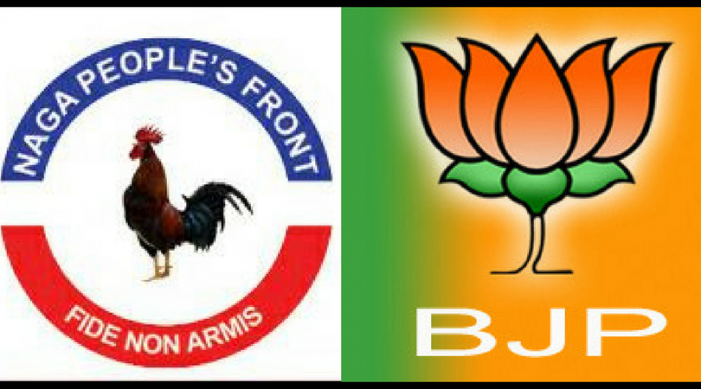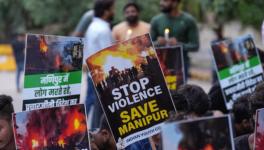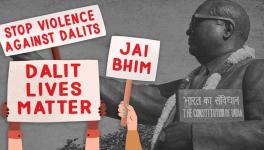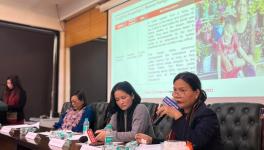A Scheduled Parting of Ways

Image Courtesy: newsd.in
The decision of the Naga People’s Front (NPF) to ‘in principle’ pull out of the alliance with the Bharatiya Janata Party (BJP) in Manipur was in the making for a long time. At first, there was speculation that the NPF would pull out after the BJP snubbed them in Nagaland by siding with Neiphiu Rio’s National Democratic Progressive Party (NDPP). However, it took over a year for the NPF in Manipur to actually act on the snub. There may be several reasons for this, notwithstanding the Nagaland unit’s alliance with the Congress in the Lok Sabha polls.
The Naga People’s Council became the NPF in October 2002. At times, the party had sided with neither the Congress-led United Progressive Alliance (UPA) or the BJP’s National Democratic Alliance (NDA). However, their last alliance was with the NDA both in Parliament as well as in the Manipur state Assembly. The souring of relations began in late 2017 and 2018, when former Nagaland Chief Minister and member of Parliament (MP) Neiphiu Rio broke ranks with the party to form the NDPP. The NDPP mostly consisted of Rio’s supporters within the NPF whereas former Nagaland Chief Ministers TR Zeliang and Shurhozelie Liezietsu were left in the lurch. Both the NPF as well as the NDPP lobbied for an alliance with the BJP ahead of the Nagaland legislative Assembly polls in February 2018. However, the BJP sided with the NDPP. Though the NPF emerged as the single largest party, the NDPP-led alliance with the BJP formed the government.
This snub was not unnoticed in Manipur where the NPF was an alliance partner of the BJP-led government. However, the Manipur unit of the NPF chose to stick with the alliance. This then begs the question, what has changed now? Speculative answers that may have led to this changed equation are, firstly, that the NPF may be expecting a change of regime in the union government. Another possibility is that the decision of the Nagaland state unit of the party decided to back the Congress candidate and has been in talks with the Manipur unit to sever its ties with the saffron party.
Also Read | Elections 2019: Protracted Talks Ahead of the Polls
The alliance with the Congress, though unexpected did not come as a shock since the BJP had already ditched the NPF. The Congress was the primary political rival of the NPF. This pattern has played out in most states in the Northeast where, in the past, the BJP had little to no presence and the Congress assumed the role of a political force that regional and state parties competed with. The official explanation that the NPF provided for their decision to back the Congress candidate in the 2019 Lok Sabha elections was contained in the Congress manifesto; review of the Armed Forces (Special Powers) Act, 1958 (AFSPA), and opposition to the Citizenship Amendment Bill (CAB).
In the case of AFSPA, the territory now known as Nagaland was the first area in the entire country to have the Act enforced post independence. The Act has never been lifted since and that, in turn, has fuelled resentment among many sections of the population. AFSPA is enforced when a civilian government declares an area as ‘disturbed’. After which the Army is called in to ‘aid’ the civilian government in controlling the ‘disturbance’. The Naga People’s Movement for Human Rights had in the past moved a petition in the Supreme Court against atrocities committed by the Armed Forces under the protection of AFSPA. They had challenged sections 4 and 6 of AFSPA. Section 4 allows any commissioned, non-commissioned or warrant officer in the armed forces to fire upon any person after giving warning even if it causes death. Further, they can search any premises or arrest any person without warrant. Section 6 of AFSPA, on the other hand, presumes good faith for all the actions of the armed forces in an area where the Act is in force. The Supreme Court, however, declined striking down both the section and the Act, and instead issued directions that would form a part of the standard operating procedures (SOP) of the Armed Forces when working under AFSPA. Due to its draconian nature, AFSPA has been said to be an extraordinary law reserved for limited operation in abnormal circumstances. This could lead one to wonder whether the abnormal has been the normal for Nagaland since 1958.
Also Read | Nagaland: Mindlessness of AFSPA
The Naga National Political Groups (NNPGs) and other armed opposition groups have had ceasefires with the Government of India and are currently in talks. As a result, the fighting has been greatly reduced. The only activities of the armed forces at present are to arrest cadres of the armed political groups who violate the terms of the cease fire agreements by carrying arms outside their designated camps. In Manipur, however, AFSPA is a bigger concern. Firstly, the people of Manipur have refused to allow the ceasefire with the Naga underground to be operative in the state.
The CAB, on the other hand, has been an issue that was widely opposed across the Northeast. The Bill would de facto accord refugee status to all migrants from Afghanistan, Pakistan and Bangladesh – whether entering legally or not – to acquire Indian citizenship, provided they are either Hindu, Sikh, Buddhist, Jain or Parsi. The Bill was brought about in 2016, however, it was in 2018 and 2019 when the opposition to it reached a boiling point. The Bill caused the BJP’s ally in Assam, the Asom Gana Parishad (AGP) to walk out of the alliance. However, the AGP later walked back into the alliance just before the Lok Sabha polls.
The opposition to the Bill from the Northeast has been on the grounds of a fear of influx from Bangladesh. Though in the past, Assam has been the most prominent site where the fear resulted in pogroms and agitations, the other states too have their fair share of suspicion directed at non-locals. In Nagaland, due to the operation of the Inner Line Permit System (ILP), the entry of non-locals is strictly regulated. However, Dimapur is the exception to the ILP system. In February this year, the NDPP-led government proposed to bring Dimapur under the ILP system as well. Such proposals would not appear unless there is a strong public sentiment against being submerged by non-locals. In this backdrop, the CAB would certainly complicate matters for any government.
However, the NPF breaking with the BJP ought to be taken with a grain of salt. Firstly, TR Zeliang’s tweet mentioned that the break would happen after the elections, presumably meaning after May 23. This kind of ‘break’ smells eerily similar to the AGP walking away and walking back. In other words, the ‘break’ may only be the frustration of the jilted.
Read More | A Peep into the Crystal Ball for the Northeast
Get the latest reports & analysis with people's perspective on Protests, movements & deep analytical videos, discussions of the current affairs in your Telegram app. Subscribe to NewsClick's Telegram channel & get Real-Time updates on stories, as they get published on our website.
























